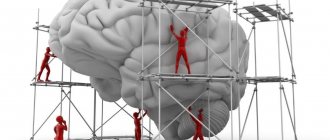Over the past few years, interest in the concept of “empathy” has increased significantly: if previously this term was used only in scientific circles by philosophers and psychologists, now it can be found both in fiction and journalistic literature, and in everyday communication. This growth in its popularity is due to the fact that empathy plays a huge role in interpersonal communication and is of particular importance for absolutely all people without exception.
However, despite the introduction of this scientific term to the masses, many people still do not fully understand what it actually means: the vast majority believe that empathy is synonymous with sympathy, but this is not entirely true.
In order to dispel this common misconception, we have prepared this article, from which you will learn how the term “empathy” arose and developed, what levels of empathy exist, what opportunities are hidden in highly developed empathic abilities, how to evaluate and improve them.
What is empathy in psychology?
For the first time, E. Titchener, a psychologist from America, drew attention to the chosen quality. What is empathy definition in psychology according to Titchener:
Empathy is a person’s ability to respond to the emotional manifestations of other people, share their feelings, realize the depth of grief or joy, without losing touch with reality. The ability to consciously project onto oneself the feelings of another person. Empathy is inherent in nature and is present in almost everyone. An example is the bond between mother and child. They have a deep emotional connection and react acutely to each other's mood swings.
► The most banal procedure, such as vaccination, can cause hysterics not only in the baby, but also in his adult mother. Parents experience the first visit to kindergarten and being with strangers even more acutely than their children. This mechanism works especially well with loved ones, relatives and friends. The feelings of a stranger and distant person do not have such meaning and empathy in this case is muffled.
► An empathic person reacts sharply not only to events occurring in the present time. He is able to empathize with the heroes of works of art, sobbing and laughing while hugging a book or when attending a movie show. An empathic person is, one might say, a normal individual. After all, the ability to empathize is connected with the evolution of all humanity. Some mental illnesses and characteristics (for example, autism) are characterized by an inability to read and understand the emotions of others.
► Empathy in psychology is a separate area that is still being studied. While an empath is a person who understands the emotions of others, he can not only sympathize, but also manipulate them. Empaths are divided into two types - those who read emotions and maintain a cool head and those who very keenly feel other people's pain and joy, losing self-control.
There are also those who are in the middle between the two extremes, and it is they who are taken as the standard of humanity. Such people will be discussed in the article. About those who know how to empathize, but do not seek to use the emotions of others to their advantage.
Rules for controlling the ability to empathize
In psychology there is a concept called “empathic fatigue.” It affects people whose jobs involve compassion and empathy every day: medical personnel, social service workers, rescuers. Faced with blood, pain and death every day, such people experience emotional empathic burnout syndrome.
If a person feels that he is an HSP and is gradually becoming emotionally exhausted, then preventive measures should be taken on “mental hygiene”.
You should learn to control and restrain your emotions. Move from identical suffering to rational help. Try to help the person in a detached manner, without letting his grief pass through you.
Empaths tend to be embarrassed to ask for help themselves. There is no need to do this. If you are in trouble, find yourself in a difficult situation, or just need someone to cry to, then feel free to contact people. You have helped many, let them help you too. It will happen that your imaginary loved ones will not want to sympathize, analyze whether you are wasting your life on people who will not tear themselves away from the sofa for you. Think rationally!
Avoid watching programs that will evoke emotions of sadness and compassion. Your films are comedies!
To gain energy, follow the banal rules: get enough sleep, spend time in nature, eat right.
What types of empathy is divided into?
Types of empathy in psychology - a classification adopted in the science of emotions. According to it, you can understand what empathy is like.
Cognitive empathy
▪️ Cognitive empathy is the ability not only to empathize, but also to analyze actions, compare them with the actions of the object. With this form, the empath's feelings are based on his own experiences in the past and experiences gained. He reads emotions based on facial expressions, gestures, eye expressions, and intonation. Cognitive empathy facilitates personal communication and building business relationships through understanding the personality of the interlocutor.
Emotional empathy
▪️ From a scientific point of view, emotional empathy is a deep immersion into the personality of the interlocutor with a complete or partial loss of self-control. Emotional empaths have a special structure of the nervous system; they are able to project the pain and joy of others onto themselves, feeling them as acutely as those who exude them. This quality is fraught with stress, nervous breakdowns and emotional instability. Such a person is capable of losing peace for a long time from any bad news in the world.
Predicative empathy
▪️ The third type is called predicative empathy - this is the ability to predict someone else's reaction. A person is able to foresee how the interlocutor will behave in a given situation. A predictively developed empath not only understands what is happening to others, he does it consciously, understanding the motives of their behavior. Therefore, he tries to behave tactfully, without violating someone else’s personal space and psychological comfort. One person can have different types of empathy at the same time. It also happens the other way around - an individual does not understand the mood of others at all, with all the ensuing consequences.
We differentiate concepts
This is a fairly new term (it was introduced by E. Titchener in 1912), little studied and complex. Therefore, it is often confused with other related concepts.
Sympathy
What is the difference between sympathy and empathy? Let's start with the fact that sympathy is a stable emotional predisposition towards someone. You can feel it towards a colleague, neighbor, distant relative. This means that you like the person, you understand him, you find something in common, and you enjoy communicating with him.
Empathy is not stable. It can arise out of nowhere, completely unexpectedly. For example, we heard a pitiful story on the radio and burst into tears because we felt sorry for its main character. We saw a young man without legs in a wheelchair in the park - we got emotional, wanted to know the details of his fate and help, they came up and started talking, feeling his pain deep in their souls. But this does not mean that you like them, you do not compare them with yourself and are unlikely to be ready to continue communication in the future.
Sympathy
What is the difference between empathy and sympathy? The latter involves an expression of concern and care, a desire to help. But this does not mean at all that the sympathizer will experience the same emotions as the object of his worries. He will say words of support, provide all possible assistance, but nothing more.
To better understand the differences between these concepts, imagine the following situation. Someone fell into a deep hole and cannot get out. Sympathy is when a person passing by will sit on the edge and talk to the fallen person, maintaining his morale and spirit. A sympathizer will offer him to throw food there or go for help. And the empath will jump into his hole and share his fate with him.
Levels of empathy in psychology
To find out how capable a person is of empathy, tests are used. Such diagnostics of the level of empathy helps to better understand a person. Especially sensitive people themselves need help and diagnostics in this case is a useful tool. Levels of empathic interaction are calculated using a list of questions that the test taker answers. Most often, the method of I. Yusupov or A. Mehrabyan is used.
High level
According to the test results, some individuals have a high level of empathy - this is the natural ability to feel the emotions of others better than their own. Only a few have this property. Highly developed empaths project other people's problems onto themselves, traumatizing their own psyche.
A high level of empathy is characterized by generosity, sincerity, and the ability to forgive offenses. These advantages become disadvantages when others begin to take advantage of them. Colleagues and relatives tend to parasitize on a gentle character, and scammers choose empaths as an easy victim.
High empathy does not tolerate offensive behavior towards another, the individual is always tactful and avoids painful topics, as well as does not show excessive curiosity. A high degree of empathy is inherent in creative people with a rich inner world and imagination. The mental balance of such people is very precarious, their mood is changeable. Increased empathy significantly spoils the life of its owner.
Average level
According to the classification, an average level of empathy is a property that most people have. Regardless of social status and profession, people are able to show signs of empathy:
☑️ The ability to “hear” the interlocutor, the desire to understand;
☑️ The ability to put yourself in another person’s place, to imagine their emotions, both positive and negative. This is especially true for situations such as the loss of a loved one or the joy of the birth of a child;
☑️ Understanding the suffering of others and the ability to empathize with them.
An average level of empathy indicates that a person is mentally healthy and can live successfully in a society of his own kind.
Most people are ready to provide support in a difficult situation and show an emotional response. However, a person with an average level has a self-defense mechanism, and he will not plunge too deeply and for a long time into the suffering of others. The instinct of self-preservation will not allow you to engage in self-destruction because of other people's problems.
Low level
Indifferent people most often have low levels of empathy. If the coldness is not a result of upbringing or a mask, such an empath does not suffer from other people's problems. A person with a low level of empathy lives for himself, he is not touched by the suffering of others, and his emotional background is low. Tears or bright manifestations of joy are extremely rare for empaths.
Low empathy means focusing on oneself and the inability to understand another. A low level of empathy indicates undeveloped communication skills. Such people choose activities that are not related to working in a team. Old people and children, with their whims, frighten a low-level empath, as do animals. He avoids them all. Criticism causes negative emotions, but the reaction to it is short-lived. Such individuals received the nickname thick-skinned. They are also sometimes called introverts.
What are the signs that a person has empathy?
In addition to several types, experts also identify signs of empathy.
✔️ Showing empathy in the desire to help. Every person from time to time finds himself in a situation where he needs support.
In the event of emotional upheaval, we tend to lose self-control and adequately assess what is happening. The presence of someone who will serve as a support during such a period is a vital necessity.
✔️ If someone has the ability to empathize, he strives to help. At the same time, he does this willingly, without expecting gratitude. Selfless friendship is one example that demonstrates how people show empathy towards each other.
The ability to empathize and sympathize with others manifests itself regardless of whether a person has received gratitude and appreciation in return. An empathetic person uses his character traits to increase self-esteem. This brings him moral satisfaction.
✔️ The feeling of empathy is adjacent to the ability to listen to other people. Most of us can spend hours talking about our problems and talking about personal experiences. At the same time, the interlocutor remains in the shadows, and any attempt to do the same is suppressed during the “conversation”, or rather, a monologue.
✔️ An empathetic person is observant, he notices emotions and listens to words. And he does this without judgment or the desire to lecture him in response. Even for a bad deed, he will try to find, if not an excuse, then at least an explanation. Next to such a person, the interlocutor feels important and this has a beneficial effect on mood and increases self-esteem. He feels that he will receive not only support, but also practical advice.
✔️ Sincerity and empathy. The depth of these experiences depends on the degree of empathy. Feeling someone else's pain as if it were your own brings real suffering, depriving the empath of appetite and sleep. Sometimes, from too deep experiences, he falls into a state similar to depression. Managing your emotions is just as important as having empathy. A natural quality given to people can be beneficial or harmful, depending on how it is used.
Examples of empathy in psychology
In addition to developing the skill itself, you need to pay attention to controlling it. Being overly immersed in other people's emotions can lead to empathy fatigue.
A striking example of empathy in psychology from life is people working in areas related to saving others. Doctors and rescuers face physical and mental suffering every day. Seeing death and pain, they are on the verge of emotional (empathic burnout). Sometimes so-called professional deformation occurs - from a sympathetic savior a person turns into a cynical and cold specialist. This is how the instinct of self-preservation works.
An example from life where empathy is necessary is the pedagogical sphere. Teachers and educators simply must have this quality. Not all adults know how to communicate with children, and some are even afraid of them. It's all about vivid emotions and undeveloped control over feelings. Teachers feel the psychological mood of each child and help him cope with emotions. Those who are characterized by increased empathy often choose professions related to communication and helping.
An empathic person, with the necessary knowledge, can make a career in any field. The ability to control your feelings is an important component. You need to learn to restrain the emotions that rush out at the sight of other people's suffering and delight. Help needs to be provided while distancing slightly. By letting deep grief pass through your psyche, you can deplete all the resources necessary for life.
Empathy in psychology is a narrow scientific concept that is part of a larger phenomenon called “sympathy.” The term is of Greek origin and translates as “suffering.” Empathy is not always associated specifically with the emotional sphere. Sometimes the term is applied to intellectual actions.
The doctor diagnosing the patient shows empathy by listening to his words and description of symptoms.
The ability to empathize is a normal human quality. It has gradations from a light emotional response to a deep immersion in the world of another person. It is believed that interaction occurs through reading information from gestures, facial expressions, and intonation. An important condition is that an empath must understand and realize that he is reacting to other people’s emotions and not identify himself with the object of sympathy.
Tips if you are an empath
If you are already an empath, then it is important for you to remember the following simple rules that will make your life much easier:
- Loneliness is not always a bad thing; devoting all your free time to other people will burn you out and even drive you crazy;
- The emotions that overwhelm you can be expressed in dance, drawing, song;
- Dream! Sometimes it’s useful to dream, even if it’s about the impossible;
- Don't limit yourself to important things. This will lead you to depression;
- It is impossible to always do only what is interesting. But since it is interest that fuels your desire to complete a particular task, before you start work, understand why a particular task is interesting.
- Communicate more with animals. Go for a walk in the park or forest. This will help you cope with the burden of emotions.
Stick to the rules and you will feel better!
Is empathy good or bad?
The benefits of understanding other people's emotions are obvious. If you do not take extremes into account, this skill helps in your career, facilitates communication, improves the psychological mood in the team and helps to increase self-esteem. Does developed empathy have pros and cons? Obviously yes. The benefits of empathy have already been outlined in the article, but we need to understand how empathy affects a person from the negative side. Empathy in communication can not only improve mental state, but also worsen it, acting suppressive.
► Hyperempathy is fraught with emotional overload and breakdowns. A person is forced to pass everything that happens around him through his consciousness. At the same time, a trace of someone else’s pain and suffering remains in the soul. Recovery takes a long time.
► Hyper-responsibility is a quality that strong empaths have. They often feel excessive guilt for events that they have nothing to do with. Believing that they are obliged to help everyone and everyone, they are not able to calculate their own strengths and capabilities.
► Empathic abilities can develop into extreme degrees of altruism and self-sacrifice. By helping someone to the detriment of his own interests, a person gradually plunges into the swamp of his unresolved problems.
► High empaths are naturally sensitive and are unable to act rudely or harshly towards others. They suffer from rudeness and give the impression of weak-willed people whose weakness can be taken advantage of.
Why is it difficult for an empath to find a partner?
Some empaths have a hard time finding a partner. This is related to:
- A reverent attitude towards personal space. People who are overloaded with other people's emotions sometimes need a break from everyone, including their partner. Not everyone agrees to treat a life partner with respect and understanding who periodically disappears for several hours. Goes for a walk alone or locks himself in his own room.
- Excessive vulnerability of empaths. They always think before they say something and expect the same thoughtful attitude from you.
- Empaths do not accept superficial feelings; they need to give themselves completely.
- You need to believe in an empath and constantly support him. Criticism is poorly received.
If an overly sensitive nature does not want to receive guests, go to a friend’s house, or generally communicate with anyone, you should not force it. An empath can easily become the life of the party, but only if he wants it himself. He certainly needs communication. But not imposed from the outside. Also, lying is never a good foundation for a relationship. And in relation to empaths, it is also dangerous, since such people definitely will not tolerate liars. Conflict cannot be avoided.
Thus, the prospective partner needs to be truthful, considerate and compassionate. That is. also have empathic qualities.
An empath can close himself off to everyone!










